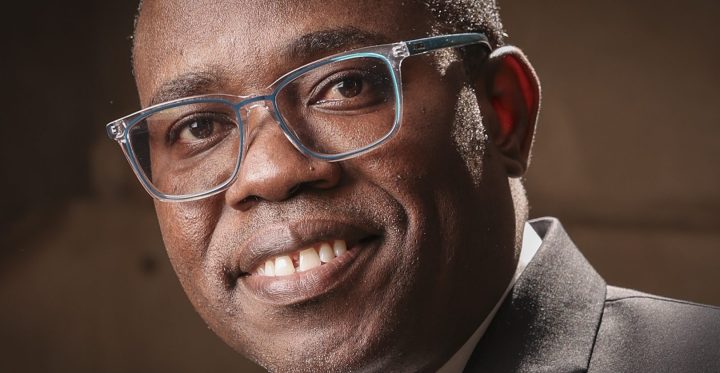DAILY MAVERICK INTERVIEW
Meet the new chief of the University of Johannesburg – ‘We need solid academic leaders’

Letlhokwa Mpedi aims to build on the University of Johannesburg’s stellar reputation as a centre of technology expertise – and even has lofty ambitions to start a new medical school.
Prof Letlhokwa George Mpedi (47), who boasts qualifications from internationally acclaimed institutions including Oxford and Harvard, was being headhunted for another post when he opted to take up the job as the vice-chancellor and principal of the University of Johannesburg.
He did so because he is passionate about higher education and wants to make a meaningful contribution in academia – and because, he argues, the sector needs “solid academic leaders”.
Mpedi has co-authored several books, published more than 30 peer-reviewed articles, and is among the country’s best researchers, according to the National Research Foundation rating system.
He possesses a UJ doctorate in law, has several awards and accolades from respected institutions across the globe and, despite his accomplishments, he is quite modest about his achievements, describing himself as an “accidental” university manager.
He sat down with DM168 in his office on the Auckland Park campus hours before his inauguration and investiture as vice-chancellor and principal of UJ.

A general view of University of Johannesburg (UJ) on June 05, 2020 in Johannesburg, South Africa. (Photo: Gallo Images/ER Lombard)
As a young boy, born and raised in a small village in Hammanskraal, north of Pretoria, Mpedi aspired to be the best criminal lawyer in town. This dream changed when he discovered his love for research and teaching.
“To be honest, I am an accidental university manager or administrator. I have always been comfortable behind my desk doing my research.”
However, after he graduated with a PhD in law, he became the first black head of department when a colleague said, “Look George, people who can do the job have a duty to avail themselves otherwise they shouldn’t complain when chancers take certain leadership roles and mess things up.”
Scaling greater heights
Those words made a lasting impression.
Mpedi decided to accept the “challenge” put before him. He climbed the ranks, from HOD to dean of students, and temporarily served as deputy vice-chancellor, among other roles.
“I am sure you’ll agree with me that the sector is bone-dry with really proper, solid, academic leaders. Remember, if someone is a professor it does not automatically make them a good academic,” he said.
When he was just six, Mpedi lost his father Daniel, who worked as an earthmoving equipment operator at a construction firm. His mother Josephine had to support her five children with a monthly grant of R222.22 from the Workmen’s Compensation Fund.
He recalled his family’s difficulties and how it became clear that education was the only way out of poverty.
“We should never downplay the power of education to change the lives of ordinary people. I wouldn’t be sitting here if it wasn’t for education.”
Mpedi is taking over from Prof Tshilidzi Marwala, who was instrumental in UJ being dubbed “the Fourth Industrial Revolution (4IR) university” – with a slew of rankings and research metrics to back up the epithet.
Last month, the QS World University Rankings placed UJ second nationally and on the continent. In The Times Higher Education Impact Rankings, UJ ranked first in South Africa and second in Africa.
Mpedi aims to build on this stature and take it a step higher – for the benefit of the university and South African society as a whole.
“What we are saying is, it’s one thing to understand there are these technologies, but we are going to be more deliberate in ensuring that whatever we do in the 4IR space impacts society in a positive way. We highlight challenges and propose ways and means to mitigate adverse effects of 4IR.”
He is a staunch believer that, “if technology does not help improve lives, does not help us advance humanity, then it’s of no use”.
Medical school like no other
Mpedi believes he has adequate support from the university staff, its council, the chancellor and the national government, and he will be able to hit the ground running.
One ambitious goal, which will require the assistance of the national government, is to establish a medical school.
“As UJ, we are ready to launch a medical school. If the national departments of health and education can support and trust us, we would bring a medical school like no other in South Africa; we would combine medicine and technology and be leaders in that regard.
“If we get the go-ahead today, we are prepared to even put in our own limited resources,” he said.
State of higher education
Mpedi is taking up his new position at a time of great turmoil in the higher education sector, particularly as some institutions are grappling with corruption, maintaining independence and resisting government attempts to influence research and, sometimes, the actual running of institutions.
The new vice-chancellor credits UJ’s ability to maintain its independence and accountability and bring on board the right people and keep strong systems in place.
“If you have weak systems, it opens the door for external infiltration and influence.”
Other institutions are also grappling with admission challenges, heightened student protests over funding, accommodation and historical student debt.
“We have so many kids who want to come to university but there is no space for them; it’s painful for us to turn away students who qualify to study with us but are unable to do so because of space constraints.
“As a sector, we really need to work hard at ensuring we work with kids in the system, that we support them to complete in time and free up space. The reality is some students stay longer because they fail.”
Mpedi believes South Africa needs more universities, “but, at the same time, people should not only be shepherded towards universities: we need people who’ll work with their hands; our TVET colleges must be strengthened, and so on.”
The pie is too small
Unlike Wits University, located just down the road, UJ had minimal student protests. Mpedi credits this to the university’s ability to be proactive and prepare for hard times well in advance.
Wits management promises firm action against ‘disruptors’ after students protest in city streets
“At UJ, we are investing a lot of our own resources. Of course there is some money that comes from the department, but the problem is that the pie is too small and there are a lot of competing interests.”
On where the sector is headed, Mpedi said: “As a country, a lot depends on what we do today to secure the future, otherwise we are going to lose talent.”
Despite the turmoil in the sector, Mpedi believes UJ is doing relatively well, However, the university cannot operate in a vacuum. In a nutshell, a lot needs to be done in the sector with the limited resources available, which brought Mpedi back to concerns about a lack of good academic leaders.
“We need to invest more in our higher education sector, supporting students, strengthening the current capacity. We cannot compete in a meaningful way with the private sector.
“One professor said to me: ‘In academia, your rewards are in heaven.’ You cannot tell people that you have to give them a meaningful salary,” said Mpedi.
A most learned man
Professor Letlhokwa George Mpedi completed his BJuris degree (1996) and LLB degree (1998) at Vista University. In 2001, he got an LLM degree in labour law from the then Rand Afrikaans University (now University of Johannesburg). He was twice a recipient of the Deutscher Akademischer Austauschdienst award for research in Germany. A National Research Foundation research award was granted to him in 2002. After his LLB he was a junior lecturer in mercantile law at Vista University. He joined the Centre for International and Comparative Labour and Social Security Law (CICLASS) at RAU as a researcher in 2000. In August 2003, he became a research fellow at the Max Planck Institute in Munich, Germany. In 2006, he was a deputy director at UJ and gained an LLD degree in mercantile law. Prior to his current position as executive dean, he was head of practical business law, vice-dean and director at UJ’s CICLASS. He lectured labour law and social security to LLB and postgraduate students and has delivered papers at numerous national and international conferences. Source: https://africanscientists.africa/business-directory/mpedi/ DM
This story first appeared in our weekly DM168 newspaper which is available for R25 at Pick n Pay, SPAR and Exclusive Books. For your nearest stockist, please click here.





















 Become an Insider
Become an Insider
I enjoyed reading the post, its so refreshing and gives a lot of hope on almost everything the Prof talks about here. I am in academia from the Eastern Cape, and am inspired and have saved this article to share with like minded people. Thank you Nonkululeko.
The thing that scares the hell out of me about a UJ based Medical School would be how much the cANCer would meddle and whether affirmative action policies would be emplaced for its academic staff, or students. The last thing the country needs are doctors who, according to a UJ Medical School, are qualified, but in reality received substandard training due to academic staff being appointed by virtue of their demographic attributes rather than their intellectual achievements, or, students who had been allowed through the MBChB degree on an affirmative action basis. Everyone always says, “oh, that will never happen” yet it always does, when the cANCer is involved, everything generally goes wrong because cANCer cadres suffer from the Dunning-Kruger Effect. The cANCer loves imposing its blatantly racist affirmative action policies at every opportunity, despite such recidivist policies being inane and outdated, they know their cadres are so incompetent they would never survive without affirmative action.